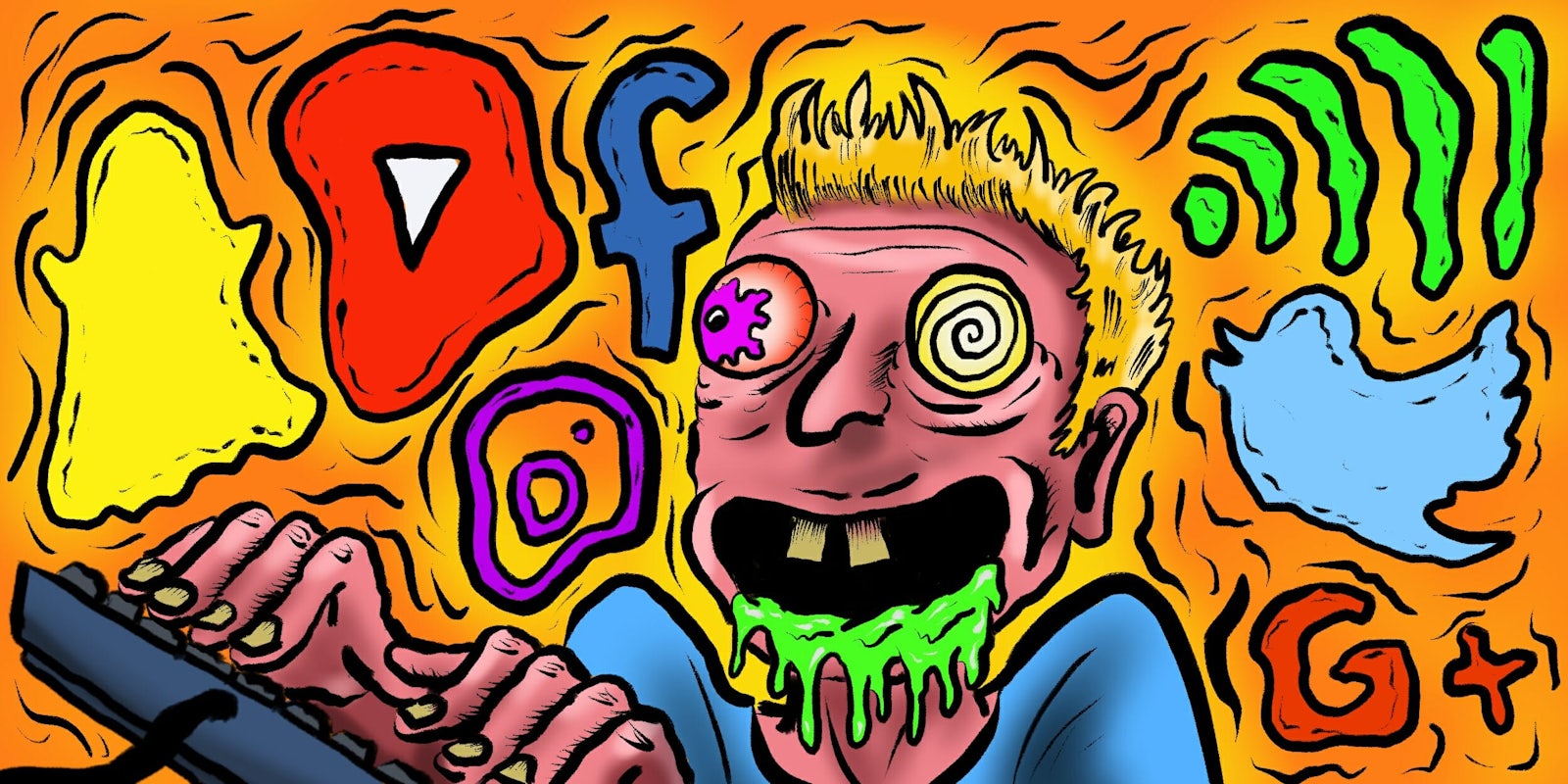Opinion
I start every working day at 8 a.m., with a cup of coffee on my desk and five columns of Twitter lists filling my laptop screen. Each of these has been tweaked over a period of years to efficiently deliver the latest memes, petty political squabbles, and bad takes. I’m already aware of most of these by the time I arrive at the keyboard because I opened the Twitter app on my phone before I ever got out of bed. I am Extremely Online.
The phrase Extremely Online—usually capitalized—dates back to at least 2014. It means to be familiar, even obsessed, with the things everyone is talking about. In practice, “online” usually means “on Twitter,” and “everyone” is just a small core of media professionals and microfamous humorists who are all fluent in the same particular set of references.
When you’re Extremely Online, you care about knowing these things. You give them power, even though they have no power over you. You speak an inscrutable language that alienates your less Online friends and acquaintances. If you have ever called someone a corncob, jokingly shouted ‘I will never log off!’ or trolled Weird Mike Cernovich, you may be Extremely Online. If you have attempted to explain, at a party, who Kurt Eichenwald is and why it’s funny that he got caught browsing anime tentacle porn, you’re definitely Extremely Online.
We Extremely Online people have a lot in common with members of pop culture fandoms, just without the pop. And sometimes, if we’re being honest, without the culture. We collect stories no normal, healthy person could possibly care about.
READ MORE:
- The complete history of the ‘69-nice’ meme on Twitter
- ‘I’m not owned’: Twitter’s most memorable meltdowns of 2017
- The best ‘is this a pigeon?’ memes take the original anime to new levels
Hardcore Harry Potter or Star Wars stans may delve deeper into the lore and minor characters of those franchises than most, but there are tens of millions of people who have some general idea what they’re talking about. Their obsessions, for the most part, aren’t antisocial.
But when an Extremely Online person wants to share a laugh about the legendary Wife Email, will anyone get the joke? That story—where a man emailed his girlfriend’s husband to say he was moving to their town, then posted that email on Twitter for some reason—is ‘legendary’ to maybe a thousand people. It has an entry on the internet culture encyclopedia Know Your Meme with 69,000 views. If you’re Extremely Online, you’re probably thinking “nice.” If you’re normal and you function in society, you have no idea what the hell I’m talking about.
These references are so thick and dense that they form their own shadow version of pop culture. Imagine if all our entertainment were cynical, contentious, and written by 20-something socialist shitposters and veterans of video game forums. If you’re Extremely Online, you don’t have to imagine. You’re already there. And I’m right there with you. I once went on NPR to explain the anti-capitalist irony inherent in kids eating Tide Pods. No one got it.
Online isn’t all over-intellectualized jokes, though. It’s also a detached, ironic stance that protects us as we voluntarily submerge our heads in the poison river of each day’s news cycle. Knowing about bad idiots who write bad tweets or bad blog posts or bad New York Times columns is not healthy. It is actively destroying our brains, making us less able to relate to those less online than us—which is to say, most people.
Mainlining the worst of humanity (and voting for it in the annual Shit Account Tournament) has severely jacked up our ability to respond appropriately to bad news. Every tragedy is just another bad thing in a world where only bad things ever happen. When there’s too much to care about, how can we care about anything? Our pain receptors shut down to protect the organism. Our default mode becomes sarcastic and defeatist: things that are bad become insanely good actually. We post our best “own” of the culprits, hope the joke lands with its tiny intended audience, and move on to the next thing. After years of constant conditioning, our brains now register this whole sad process as stimulating entertainment.
Why do we continue to lap at this useless, mean trickle of garbage juice? Even worse, why do we seek out more of it? Is it because we hate ourselves? Quite possibly, yes. Is it because we’re lonely, and we’re hooked on this simulacrum of human connection even as it makes us less relatable to the real people around us? There’s definitely some of that.
For some of us, though, it’s “for work.” You can’t contribute blog posts to the meme-industrial complex or host a Twitter-leftist podcast or … whatever Dril does … unless you’re permanently attuned to the latest joke or controversy. As someone who has made a living explaining teen memes to Olds, I’ve certainly claimed that I only tap the Twitter icon on my phone like a rat tapping its morphine button because “it’s part of the job.” But you can catch me on weekends pulling to refresh while I watch a movie, eat a meal, or have a beer. Sometimes I’ll reload Twitter in the middle of the night, knowing full well that no new posts are coming and that it wouldn’t matter if they did. At some point, you have to admit that you’re Extremely Online because you want to be. Or because you once wanted to be, and now it’s part of your identity. Who would you be if you weren’t Extremely Online? It’s an uncomfortable question, and I can think of one easy way to avoid answering it.
pull to refresh


